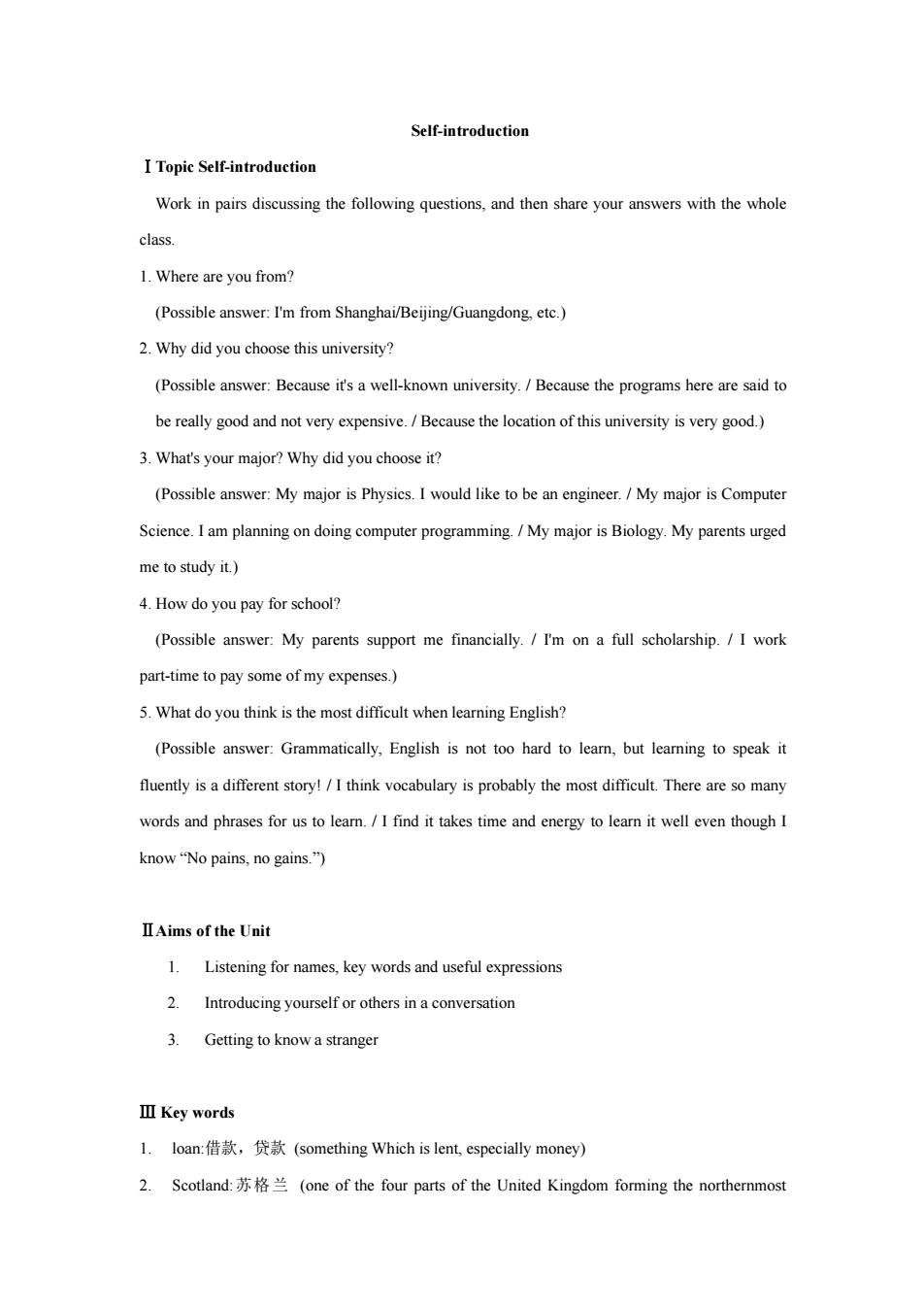
Self-introductionITopic Self-introductionWork in pairs discussing the following questions, and then share your answers with the wholeclass.1.Whereareyoufrom?(Possibleanswer:I'mfrom Shanghai/Beijing/Guangdong,etc.)2. Why did you choose this university?(Possibleanswer:Because it's a well-knownuniversity./Becausetheprograms hereare said tobe really good and not very expensive. / Because the location of this university is very good.)3. What's your major? Why did you choose it?(Possible answer: My major is Physics. I would like to be an engineer. / My major is ComputerScience. I am planning on doing computer programming. / My major is Biology. My parents urgedme to study it.)4. How do you pay for school?(Possible answer: My parents support me financially. / I'm on a full scholarship. / I workpart-time to pay some of my expenses.)5.What do you think is the mostdifficult whenlearningEnglish?(Possible answer: Grammatically, English is not too hard to learn, but learning to speak itfluently is a different story! /I think vocabulary is probably the most difficult. There are so manywords and phrases for us to learn./I find it takes time and energy to learn it well even thoughIknowNo pains, no gains.")IAims of the Unit1.Listeningfornames,keywordsand useful expressions2.Introducing yourselforothers in aconversation3.Getting to know a strangerIIIKeywords1.loan:借款,贷款(somethingWhichislent,especiallymoney)2.Scotland:苏格兰(oneofthefourpartsoftheUnitedKingdomformingthenorthernmost
Self-introduction ⅠTopic Self-introduction Work in pairs discussing the following questions, and then share your answers with the whole class. 1. Where are you from? (Possible answer: I'm from Shanghai/Beijing/Guangdong, etc.) 2. Why did you choose this university? (Possible answer: Because it's a well-known university. / Because the programs here are said to be really good and not very expensive. / Because the location of this university is very good.) 3. What's your major? Why did you choose it? (Possible answer: My major is Physics. I would like to be an engineer. / My major is Computer Science. I am planning on doing computer programming. / My major is Biology. My parents urged me to study it.) 4. How do you pay for school? (Possible answer: My parents support me financially. / I'm on a full scholarship. / I work part-time to pay some of my expenses.) 5. What do you think is the most difficult when learning English? (Possible answer: Grammatically, English is not too hard to learn, but learning to speak it fluently is a different story! / I think vocabulary is probably the most difficult. There are so many words and phrases for us to learn. / I find it takes time and energy to learn it well even though I know “No pains, no gains.”) ⅡAims of the Unit 1. Listening for names, key words and useful expressions 2. Introducing yourself or others in a conversation 3. Getting to know a stranger Ⅲ Key words 1. loan:借款,贷款 (something Which is lent, especially money) 2. Scotland:苏格兰 (one of the four parts of the United Kingdom forming the northernmost
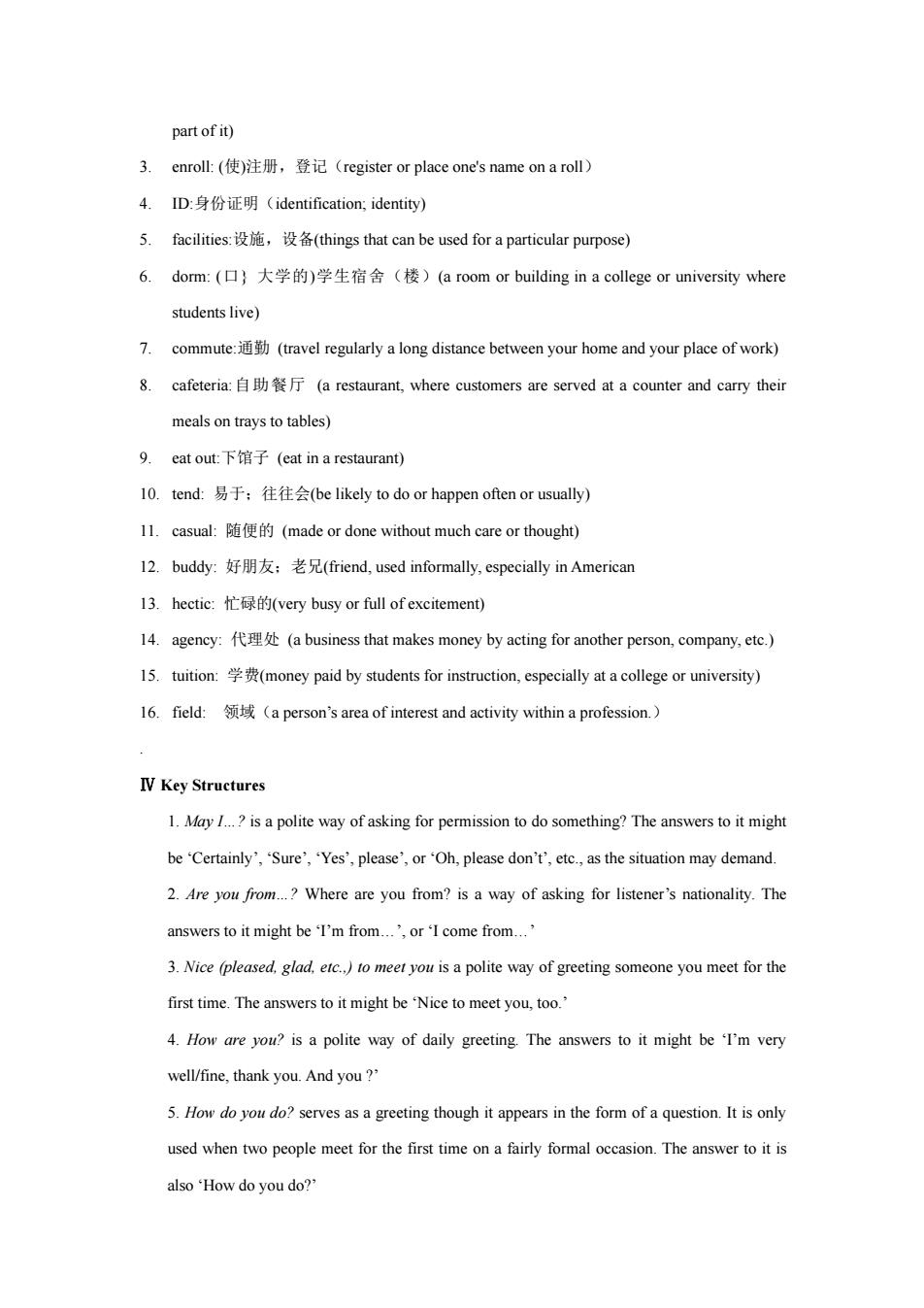
part of it)3.enroll:(使)注册,登记(registerorplaceone'snameonaroll)4.ID:身份证明(identification;identity)5.facilities:设施,设备(thingsthatcanbeusedforaparticularpurpose)6.dorm:(口)大学的)学生宿舍(楼)(aroomorbuildingina collegeoruniversitywherestudents live)7.commute:通勤(travel regularlya long distancebetween your home and yourplace of work)8.cafeteria:自助餐厅(a restaurant,where customers are served at a counter and carry theirmeals on trays to tables)9.eatout:下馆子(eatinarestaurant)10.tend:易于;往往会(belikelytodoorhappenoftenorusually)11.casual:随便的(made ordonewithoutmuchcareorthought)12.buddy:好朋友;老兄(friend,usedinformallyespeciallyinAmerican13.hectic:忙碌的(verybusyorfullofexcitement)14.agency:代理处(a business that makes money by actingfor another person, company,etc.)15.tuition:学费(money paid by students for instruction,especially at a college or university)16.field:领域(aperson'sareaofinterestand activitywithinaprofession.)IVKeyStructures1. May I...? is a polite way of asking for permission to do something?The answers to it mightbe'Certainly', Sure',"Yes,please', or Oh, please don't', etc., as the situation may demand.2.Are you from...? Where are you from? is a way of asking for listener's nationality.Theanswersto itmight beI'mfrom...,or'I come from...3.Nice (pleased, glad. etc.) to meet you is a polite way of greeting someone you meet for thefirst time. The answers to it might be 'Nice to meet you, too.4. How are you? is a polite way of daily greeting. The answers to it might be“I'm verywell/fine, thank you. And you ?'5. How do you do? serves as a greeting though it appears in the form of a question. It is onlyused when two people meet for the first time on a fairlyformal occasion.The answer to it isalsoHow do you do?
part of it) 3. enroll: (使)注册,登记(register or place one's name on a roll) 4. ID:身份证明(identification; identity) 5. facilities:设施,设备(things that can be used for a particular purpose) 6. dorm: (口} 大学的)学生宿舍(楼)(a room or building in a college or university where students live) 7. commute:通勤 (travel regularly a long distance between your home and your place of work) 8. cafeteria:自助餐厅 (a restaurant, where customers are served at a counter and carry their meals on trays to tables) 9. eat out:下馆子 (eat in a restaurant) 10. tend: 易于;往往会(be likely to do or happen often or usually) 11. casual: 随便的 (made or done without much care or thought) 12. buddy: 好朋友;老兄(friend, used informally, especially in American 13. hectic: 忙碌的(very busy or full of excitement) 14. agency: 代理处 (a business that makes money by acting for another person, company, etc.) 15. tuition: 学费(money paid by students for instruction, especially at a college or university) 16. field: 领域(a person’s area of interest and activity within a profession.) .Ⅳ Key Structures 1. May I.? is a polite way of asking for permission to do something? The answers to it might be ‘Certainly’, ‘Sure’, ‘Yes’, please’, or ‘Oh, please don’t’, etc., as the situation may demand. 2. Are you from.? Where are you from? is a way of asking for listener’s nationality. The answers to it might be ‘I’m from.’, or ‘I come from.’ 3. Nice (pleased, glad, etc.,) to meet you is a polite way of greeting someone you meet for the first time. The answers to it might be ‘Nice to meet you, too.’ 4. How are you? is a polite way of daily greeting. The answers to it might be ‘I’m very well/fine, thank you. And you ?’ 5. How do you do? serves as a greeting though it appears in the form of a question. It is only used when two people meet for the first time on a fairly formal occasion. The answer to it is also ‘How do you do?’
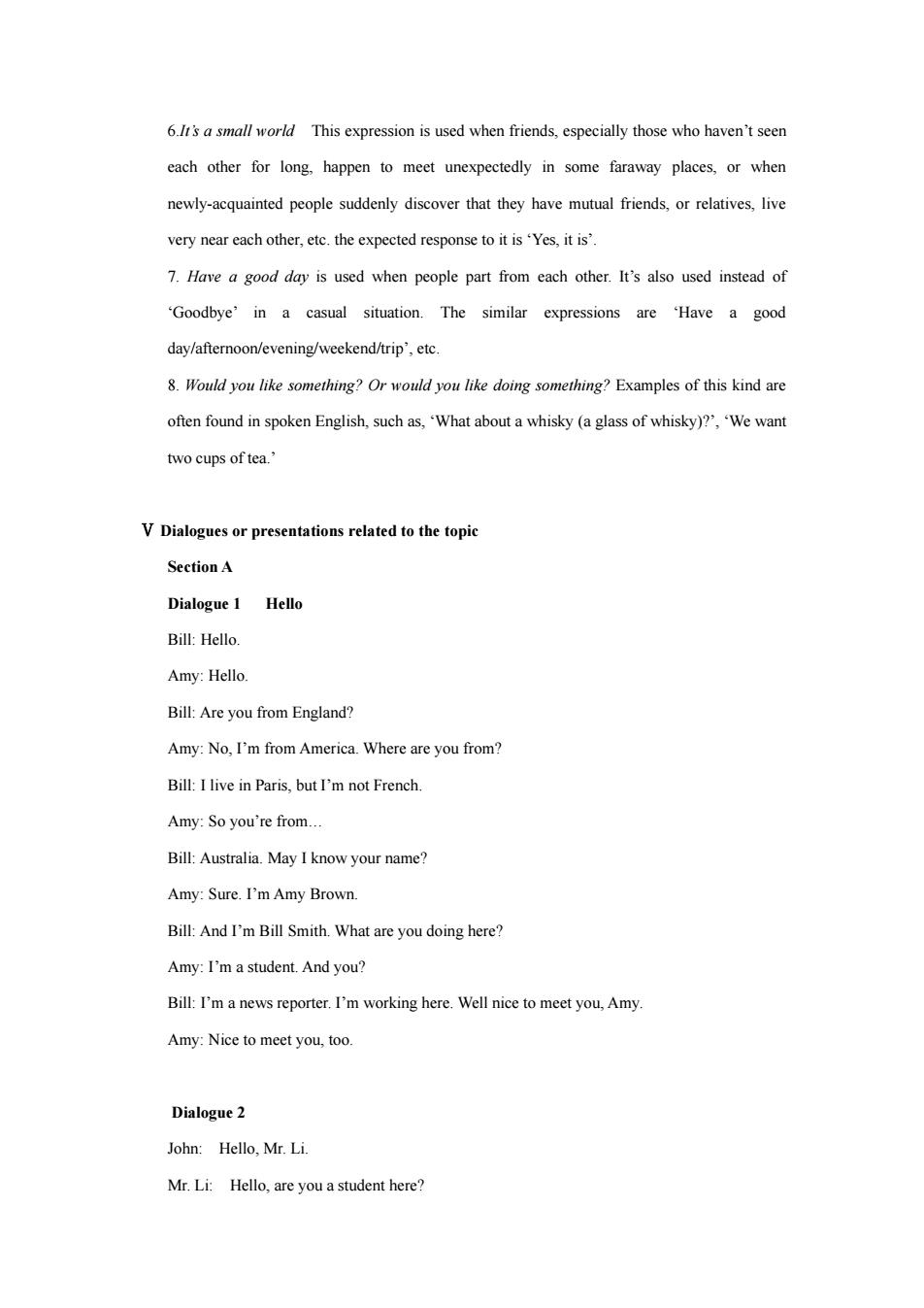
6.ltsa small worldThis expression is used whenfriends,especiallythosewhohaven't seeneach otherforlong,happen tomeetunexpectedlyinsomefaraway places,or whennewly-acquainted people suddenly discover that they have mutual friends, or relatives, livevery near each other, etc. the expected response to it is “Yes, it is.7. Have a good day is used when people part from each other. It's also used instead ofGoodbye"in a casual situation.Thesimilar expressionsareHavegoodaday/afternoon/evening/weekend/trip,etc.8. Would you like something? Or would you like doing something? Examples of this kind areoften found in spoken English, such as, What about a whisky (a glass of whisky)?", We wanttwo cups of tea.V Dialogues or presentations related to the topicSectionADialogue1HelloBill: Hello.Amy: Hello.Bill: Are you from England?Amy:No, I'm from America. Where are you from?Bill: I live in Paris, but I'm not FrenchAmy. So you're from...Bill: Australia. May I know your name?Amy: Sure. I'm Amy Brown.Bill: And I'm Bill Smith. What are you doing here?Amy: I'm a student. And you?Bill: I'm a news reporter. I'm working here. Well nice to meet you, AmyAmy: Nice to meet you, tooDialogue 2John:Hello, Mr. Li.Mr. Li:Hello, are you a student here?
6.It’s a small world This expression is used when friends, especially those who haven’t seen each other for long, happen to meet unexpectedly in some faraway places, or when newly-acquainted people suddenly discover that they have mutual friends, or relatives, live very near each other, etc. the expected response to it is ‘Yes, it is’. 7. Have a good day is used when people part from each other. It’s also used instead of ‘Goodbye’ in a casual situation. The similar expressions are ‘Have a good day/afternoon/evening/weekend/trip’, etc. 8. Would you like something? Or would you like doing something? Examples of this kind are often found in spoken English, such as, ‘What about a whisky (a glass of whisky)?’, ‘We want two cups of tea.’ Ⅴ Dialogues or presentations related to the topic Section A Dialogue 1 Hello Bill: Hello. Amy: Hello. Bill: Are you from England? Amy: No, I’m from America. Where are you from? Bill: I live in Paris, but I’m not French. Amy: So you’re from. Bill: Australia. May I know your name? Amy: Sure. I’m Amy Brown. Bill: And I’m Bill Smith. What are you doing here? Amy: I’m a student. And you? Bill: I’m a news reporter. I’m working here. Well nice to meet you, Amy. Amy: Nice to meet you, too. Dialogue 2 John: Hello, Mr. Li. Mr. Li: Hello, are you a student here?
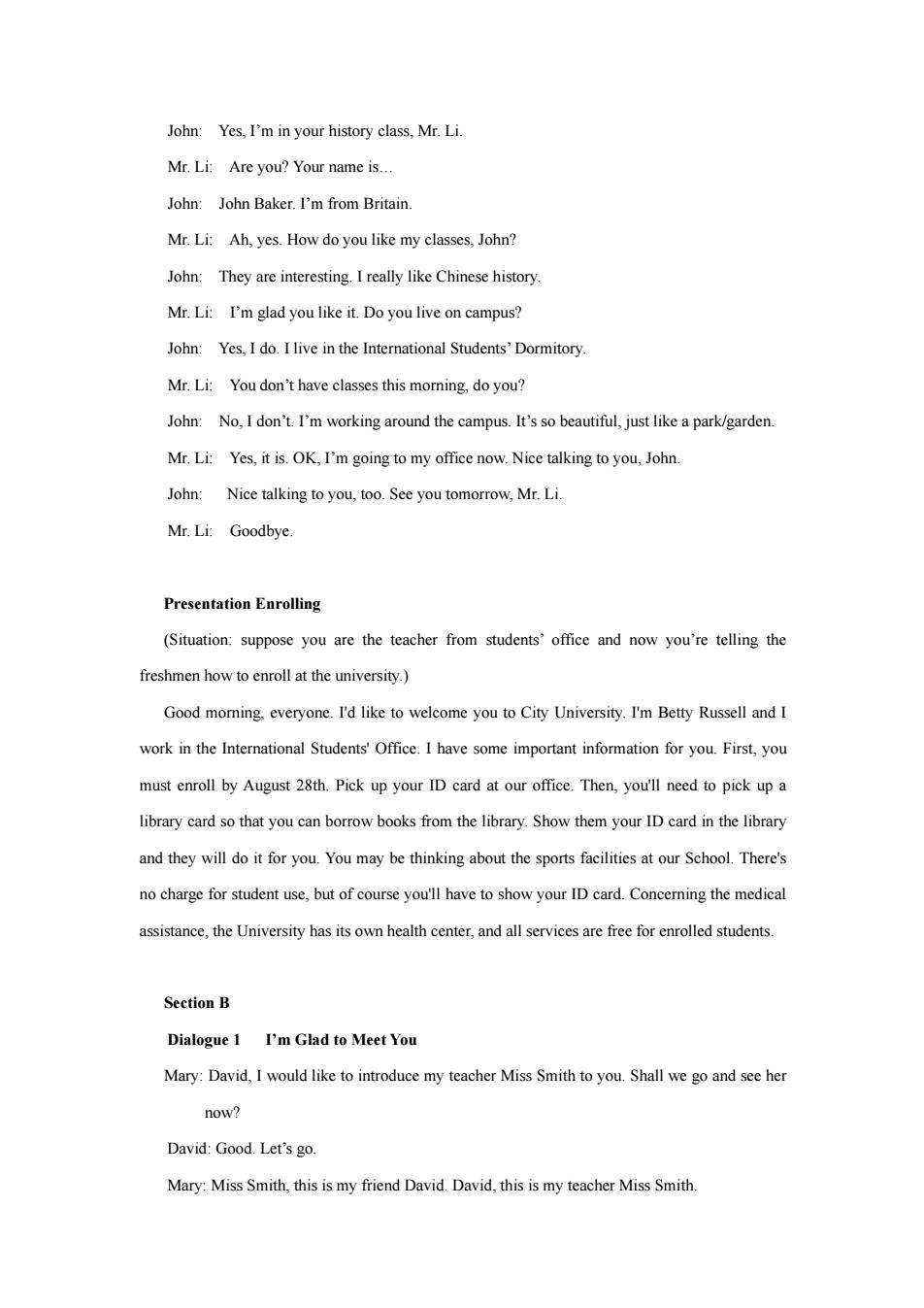
John:Yes, I'm inyour history class, Mr.Li.Mr. Li:Are you? Your name is...John:John Baker. I'm from BritainMr. Li.Ah, yes. How do you like my classes, John?John:They are interesting. I really like Chinese historyMr. Li:I'm glad you like it. Do you live on campus?John:Yes, I do. I live in the International Students'DormitoryMr. Li:You don't have classes this morning, do you?John:No,I don't. I'm working around the campus. It's so beautiful, just like a park/garden.Mr. Li.Yes, it is.OK, I'mgoing to my office now.Nice talking to you,JohnJohn:Nice talking to you, too. See you tomorrow, Mr. Li.Mr. Li:Goodbye.Presentation Enrolling(Situation: suppose you are the teacher from students'office and now you're telling thefreshmen how to enroll at the university.)Good morning. everyone. I'd like to welcome you to City University. I'm Betty Russell and Iwork in the International Students' Office.I have some important information for you. First, youmust enroll by August 28th. Pick up your ID card at our office. Then, youll need to pick up alibrary card so that you can borrow books from the library. Show them your ID card in the libraryand they will do it for you. You may be thinking about the sports facilities at our School. There'sno charge for student use, but of course you'll have to show your ID card. Concerning the medicalassistance, the University has its own health center,and all services are freefor enrolled students.Section BDialogue1I'm Gladto Meet YouMary: David, I would like to introduce my teacher Miss Smith to you. Shall we go and see hernow?David: Good. Let's go.Mary: Miss Smith, this is my friend David. David, this is my teacher Miss Smith
John: Yes, I’m in your history class, Mr. Li. Mr. Li: Are you? Your name is. John: John Baker. I’m from Britain. Mr. Li: Ah, yes. How do you like my classes, John? John: They are interesting. I really like Chinese history. Mr. Li: I’m glad you like it. Do you live on campus? John: Yes, I do. I live in the International Students’ Dormitory. Mr. Li: You don’t have classes this morning, do you? John: No, I don’t. I’m working around the campus. It’s so beautiful, just like a park/garden. Mr. Li: Yes, it is. OK, I’m going to my office now. Nice talking to you, John. John: Nice talking to you, too. See you tomorrow, Mr. Li. Mr. Li: Goodbye. Presentation Enrolling (Situation: suppose you are the teacher from students’ office and now you’re telling the freshmen how to enroll at the university.) Good morning, everyone. I'd like to welcome you to City University. I'm Betty Russell and I work in the International Students' Office. I have some important information for you. First, you must enroll by August 28th. Pick up your ID card at our office. Then, you'll need to pick up a library card so that you can borrow books from the library. Show them your ID card in the library and they will do it for you. You may be thinking about the sports facilities at our School. There's no charge for student use, but of course you'll have to show your ID card. Concerning the medical assistance, the University has its own health center, and all services are free for enrolled students. Section B Dialogue 1 I’m Glad to Meet You Mary: David, I would like to introduce my teacher Miss Smith to you. Shall we go and see her now? David: Good. Let’s go. Mary: Miss Smith, this is my friend David. David, this is my teacher Miss Smith
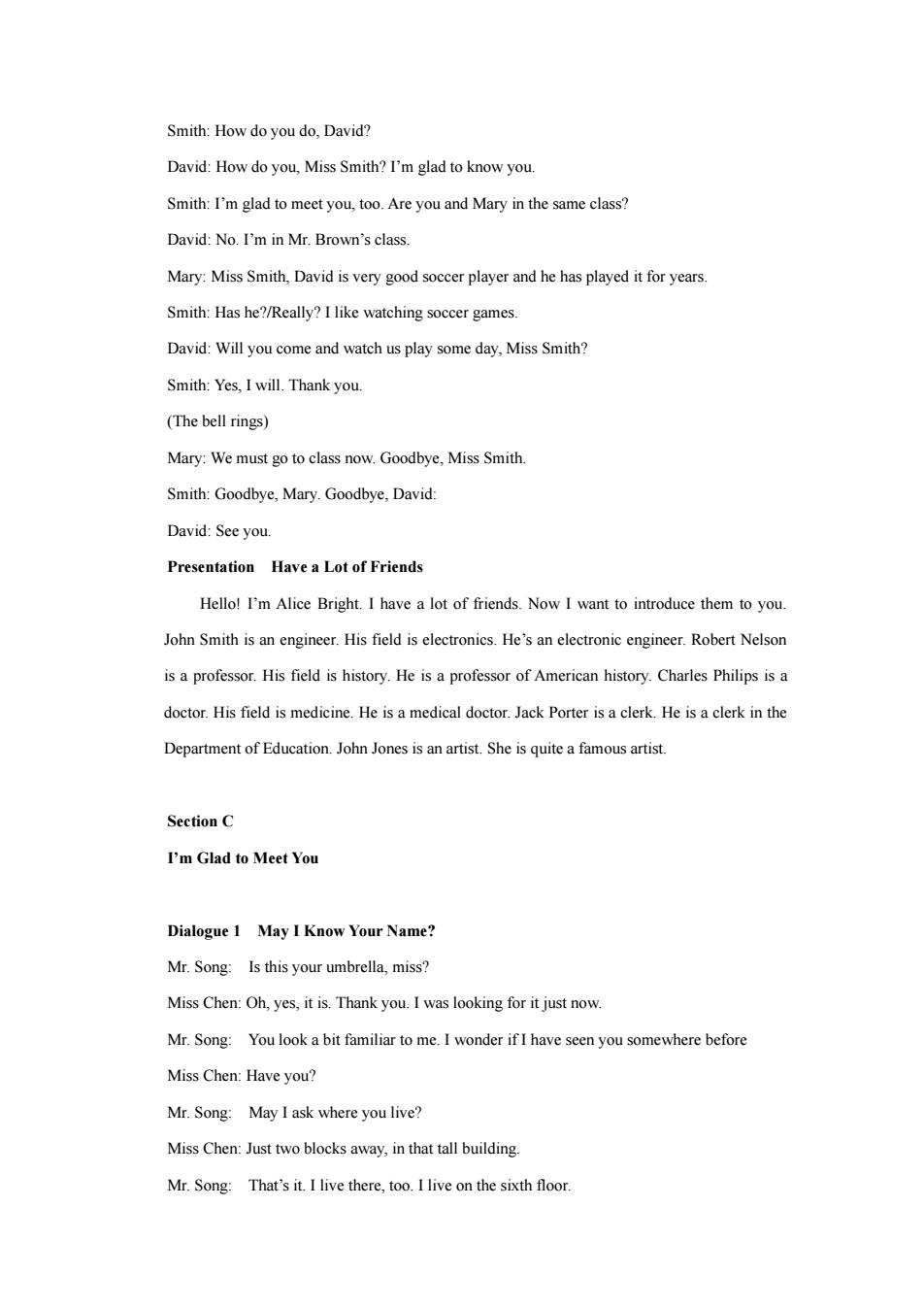
Smith: How do you do, David?David: How do you, Miss Smith?I'mglad to know youSmith: I'm glad to meet you, too.Are you and Mary in the same class?David: No. I'm in Mr. Brown's class.Mary: Miss Smith, David is very good soccer player and he has played it for years.Smith:Hashe?/Really?Ilike watching soccer games.David:Will you comeand watch us play someday, Miss Smith?Smith: Yes, I will, Thank you.(The bell rings)Mary:We must go to class now.Goodbye, Miss SmithSmith: Goodbye, Mary. Goodbye, David:David: See youl.Presentation Have a Lot of FriendsHello! I'm Alice Bright. I have a lot of friends. Now I want to introduce them to youJohn Smith is an engineer. His field is electronics. He's an electronic engineer. Robert Nelsoris a professor. His field is history. He is a professor of American history. Charles Philips is adoctor. His field is medicine. He is a medical doctor. Jack Porter is a clerk, He is a clerk in theDepartment of Education.John Jones is an artist.She is quite afamous artistSectionCI'm Glad to Meet YouDialogue1MayIKnowYourName?Mr. Song:Is this your umbrella, miss?Miss Chen: Oh, yes, it is. Thank you. I was looking for it just nowMr.Song:You look a bit familiar to me.I wonder ifIhave seen you somewhere beforeMiss Chen: Have you?Mr. SongMay I ask where you live?Miss Chen: Just two blocks away, in that tall building.Mr. Song:That's it, I live there, too. I live on the sixth floor
Smith: How do you do, David? David: How do you, Miss Smith? I’m glad to know you. Smith: I’m glad to meet you, too. Are you and Mary in the same class? David: No. I’m in Mr. Brown’s class. Mary: Miss Smith, David is very good soccer player and he has played it for years. Smith: Has he?/Really? I like watching soccer games. David: Will you come and watch us play some day, Miss Smith? Smith: Yes, I will. Thank you. (The bell rings) Mary: We must go to class now. Goodbye, Miss Smith. Smith: Goodbye, Mary. Goodbye, David: David: See you. Presentation Have a Lot of Friends Hello! I’m Alice Bright. I have a lot of friends. Now I want to introduce them to you. John Smith is an engineer. His field is electronics. He’s an electronic engineer. Robert Nelson is a professor. His field is history. He is a professor of American history. Charles Philips is a doctor. His field is medicine. He is a medical doctor. Jack Porter is a clerk. He is a clerk in the Department of Education. John Jones is an artist. She is quite a famous artist. Section C I’m Glad to Meet You Dialogue 1 May I Know Your Name? Mr. Song: Is this your umbrella, miss? Miss Chen: Oh, yes, it is. Thank you. I was looking for it just now. Mr. Song: You look a bit familiar to me. I wonder if I have seen you somewhere before Miss Chen: Have you? Mr. Song: May I ask where you live? Miss Chen: Just two blocks away, in that tall building. Mr. Song: That’s it. I live there, too. I live on the sixth floor